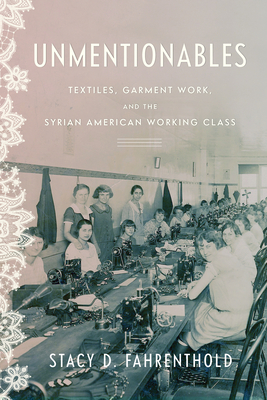Unmentionables: Textiles, Garment Work, and the Syrian American Working Class

Unmentionables: Textiles, Garment Work, and the Syrian American Working Class
As weavers, garment workers, and peddlers, Syrian immigrants in the Americas fed the early twentieth-century transnational textile trade. These migrants and the commodities they produced-silk, linen, and cotton; lace and embroidery; undergarments and ready-wear clothing-moved along steamship routes from Beirut through Marseille and Madeira to New York City, New England, and Veracruz. As migrants and merchants crisscrossed the Atlantic in pursuit of work, Syrian textile manufacturing expanded across the hemisphere. Unmentionables offers a history of the global textile industry and the Syrians, Lebanese, and Palestinians who worked in it. Stacy Fahrenthold examines how Arab workers navigated processes of racialization, immigration restriction, and labor contestation. She writes women workers-the majority of Syrian garment workers-back into US labor history. She also situates the rise of Syrian American industrial elites, who exerted supply chain power to combat labor uprisings, resist unionization, and stake claim to the global textile industry. Critiquing the hegemony of th
PRP: 294.50 Lei
Acesta este Prețul Recomandat de Producător. Prețul de vânzare al produsului este afișat mai jos.
265.05Lei
265.05Lei
294.50 LeiLivrare in 2-4 saptamani
Descrierea produsului
As weavers, garment workers, and peddlers, Syrian immigrants in the Americas fed the early twentieth-century transnational textile trade. These migrants and the commodities they produced-silk, linen, and cotton; lace and embroidery; undergarments and ready-wear clothing-moved along steamship routes from Beirut through Marseille and Madeira to New York City, New England, and Veracruz. As migrants and merchants crisscrossed the Atlantic in pursuit of work, Syrian textile manufacturing expanded across the hemisphere. Unmentionables offers a history of the global textile industry and the Syrians, Lebanese, and Palestinians who worked in it. Stacy Fahrenthold examines how Arab workers navigated processes of racialization, immigration restriction, and labor contestation. She writes women workers-the majority of Syrian garment workers-back into US labor history. She also situates the rise of Syrian American industrial elites, who exerted supply chain power to combat labor uprisings, resist unionization, and stake claim to the global textile industry. Critiquing the hegemony of th
Detaliile produsului










